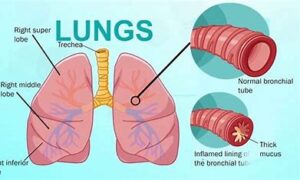Bronchitis is an inflammation of the lining of your bronchial tubes. These tubes carry air to and from your lungs. People who have bronchitis often cough up thickened mucus, which can be discolored. Bronchitis may start suddenly and be short term (acute) or start gradually and become long term (chronic).
Bronchitis is more common in winter and often develops after a cold, sore throat, or flu. The main symptom is a hacking cough, which may bring up yellow-green mucus (phlegm).
Acute bronchitis, which often develops from a cold or other respiratory infection, is very common. Also called a chest cold, acute bronchitis usually improves within a week to 10 days without lasting effects, although the cough may linger for weeks.
Chronic bronchitis, a more serious condition, is a constant irritation or inflammation of the lining of the bronchial tubes, often due to smoking. If you have repeated bouts of bronchitis, you may have chronic bronchitis, which requires medical attention. Chronic bronchitis is one of the conditions included in chronic obstructive pulmonary disease (COPD).
If you have acute bronchitis, you may have cold symptoms, such as:
- Cough
- Production of mucus (sputum), which can be clear, white, yellowish-gray or green in color — rarely, it may be streaked with blood
- Sore throat
- Mild headache and body aches
- Slight fever and chills
- Fatigue
- Chest discomfort
- Shortness of breath and wheezing
While these symptoms usually improve in about a week, you may have a nagging cough that lingers for several weeks.
For chronic bronchitis, signs and symptoms may include:
- Cough
- Production of mucus
- Fatigue
- Chest discomfort
- Shortness of breath
Chronic bronchitis is typically defined as a productive cough that lasts at least three months, with bouts that recur for at least two consecutive years. If you have chronic bronchitis, you’re likely to have periods when your cough or other symptoms worsen. It’s also possible to have an acute infection on top of chronic bronchitis.
When to see a doctor:
Contact your doctor or clinic for advice if your cough:
- Is accompanied by a fever higher than 100.4 F (38 C).
- Produces blood.
- Is associated with serious or worsening shortness of breath or wheezing.
- Includes other serious signs and symptoms, for example, you appear pale and lethargic, have a bluish tinge to your lips and nail beds, or have trouble thinking clearly or concentrating.
- Lasts more than three weeks.
Before you go in, your doctor or clinic can give you guidance on how to prepare for your appointment.

